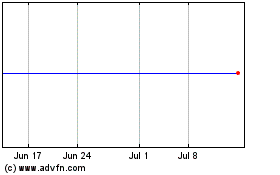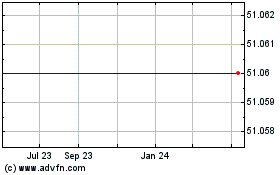By Asa Fitch in Dubai and Benoit Faucon in London
Small and midsize companies are rethinking or delaying entry to
Iran following the election of Donald Trump, a break from their
bigger counterparts which have struck recent deals despite concerns
of fresh sanctions.
Anubhav Singh, the head of global sales and marketing at South
African telecommunications-equipment maker Afripipes, said his
company was halting its postdeal exploration of the Iranian market
as a result of Mr. Trump's election.
"We're waiting to see what Trump's policies are with respect to
Iran and then take it from there," he said.
Mr. Trump hasn't commented substantively on his plans for the
Obama administration's landmark nuclear agreement with Iran --
which resulted in Tehran scaling back its nuclear capabilities in
return for the lifting of most international sanctions. But he was
sharply critical of it during his campaign. During his final debate
with Democratic opponent Hillary Clinton, Mr. Trump called it "the
stupidest deal of all time."
Gen. Michael Flynn, who was appointed national security adviser
in the Trump team, has previously called the nuclear agreement a
"bad deal" and warned it could lead to the "elimination of
Israel."
Such rhetoric hasn't stopped corporate giants such as Boeing
Co., Airbus SE, Royal Dutch Shell PLC, Total SA and Vodafone Group
PLC from testing the waters in Iran since the country's nuclear
deal with six world powers took effect in January last year. None
of those companies has suggested a shift in strategy due to Mr.
Trump's election.
Smaller companies, because of their size, can't as easily absorb
losses from ventures that have to be scrapped because of sanctions.
In the past, U.S. sanctions have had a chilling effect on companies
dealing with Iran because some of them apply on any company with
American connections.
Before the nuclear agreement was struck in 2015, several
European banks were heavily fined for breaching Washington's
restrictions on trading with Tehran. Meanwhile, oil companies
pulled out of Iran to avoid risking fines.
Bakhshish Singh, the general manager of marketing at Ambrane, an
Indian consumer-technology vendor, said his company recently
reached a distribution agreement with a partner in Dubai to sell
goods in the Iranian market. But the possibility that Iran may face
new sanctions under Mr. Trump, boosting the price of shipping his
goods there, has given him pause.
While Ambrane is sticking to its deal for now, Mr. Singh is
waiting for more clarity on how Mr. Trump plans to approach the
country.
Even some straightforward export deals have been affected. Nigel
Kushner, the chief executive of London-based law firm W Legal, said
a client canceled plans to export $1 million worth of U.K.
technologies to Iran in the wake of Mr. Trump's criticism of the
nuclear deal. Mr. Kushner said his client had referred to the
president-elect to explain its decision to pull out of the
deal.
The outlook isn't all gloomy for smaller firms. Some are hopeful
that Mr. Trump won't tear the nuclear deal to pieces. Washington
can't unilaterally undo the deal, which was reached by multiple
world powers in 2015 and is being implemented by the United Nations
and negotiating countries. But the U.S. could undermine it by
enacting new sanctions that would force companies to renounce
dealing with Iran if they want to continue trading with the U.S. or
deal with its banking system.
Iranian President Hassan Rouhani said Tuesday that the nuclear
deal wasn't a bilateral agreement, and hence he thought it unlikely
Mr. Trump would take steps to undo it. "It's a done deal," he said,
and new negotiations "don't make any sense."
Shayan Shadfar, the managing director of IranianOffice, a
company that helps foreign firms set up in Iran, said Mr. Trump's
business background will make him more of a deal maker than deal
breaker. The day after the election, he said, a large American
company got in touch about entering Iran. "I believe this is a
sign," he said.
U.S. financial restrictions on trading with Iran are likely to
remain in place under a Trump administration -- an impediment that
will affect those who do business through U.S. banks and
brokerages.
The Trump transition team didn't respond to a request for
comment.
Khaled Abdel Majeed, the founder and managing partner of the
London-based MENA Capital, hoped to be able to invest in the
Iranian stock market in the wake of the deal. But his broker
Merrill Lynch doesn't offer such trades.
"It doesn't look like it'll happen anytime soon," Mr. Majeed
said.
A Merrill Lynch spokesman confirmed that the company doesn't
allow trading in Iranian shares.
Many larger companies have said they don't anticipate a change
in plans in Iran as a result of Mr. Trump's election, and a wave of
deal-making in the country has ensued.
In December, Shell signed an agreement with Iran's state oil
company to look at future projects, though the amounts involved
have yet to be discussed. France's Total and China National
Petroleum Corp. reached a preliminary gas-development deal in early
November, worth $4.8 billion.
Outside the energy sector, U.S. aerospace giant Boeing and its
European competitor Airbus reached agreements late last year for
dozens of jets, with deals respectively worth $16.6 billion and $18
billion at list prices.
There are challenges beyond the threat of sanctions that could
slow the pace of investment in Iran. John Podaras, a partner at the
consultancy Hotel Development Resources in Dubai, said there had
been a noticeable slowdown in investment in the hospitality sector
in the second half of last year that probably has more to do with
practical issues -- including administrative delays and uncertainty
around landownership rules -- than concerns of a Trump
presidency.
Investor sentiment toward Iran, he says, "has always been quite
cautious."
Write to Asa Fitch at asa.fitch@wsj.com and Benoit Faucon at
benoit.faucon@wsj.com
(END) Dow Jones Newswires
January 18, 2017 05:44 ET (10:44 GMT)
Copyright (c) 2017 Dow Jones & Company, Inc.
Royal Dutch Shell (NYSE:RDS.B)
Historical Stock Chart
From Mar 2024 to Apr 2024

Royal Dutch Shell (NYSE:RDS.B)
Historical Stock Chart
From Apr 2023 to Apr 2024
